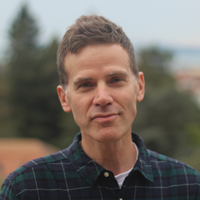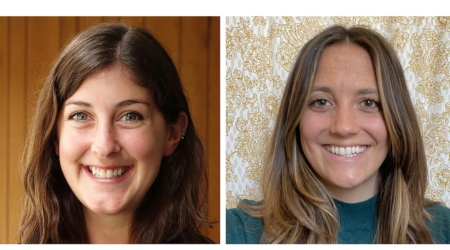Interview
Podcast
Published February 3, 2026
“Some College” and the Social Function of Higher Education: An Interview with Sarah Payne
What are the economic consequences of starting, but not completing college? On this episode of the Matrix Podcast, Sarah Harrington, Program Manager at Social Science Matrix, spoke with Sarah Payne, a sociologist who recently published a paper in Sociology of Education that examined what happens when students begin college but fail to graduate. “Although non-completion […]
Learn More >Matrix Teach-In
Recap
Published December 16, 2025
Seth Lunine: “Promise & Precarity: Exploring Oakland Through Community Engaged Scholarship”
Recorded on November 17, 2025, this video features a lecture by Seth Lunine, Lecturer in the UC Berkeley Department of Geography, who presented a talk reflecting on his experiences with collaborative scholarship between UC Berkeley undergraduates and community-based organizations in Oakland’s Fruitvale District.
Learn More >CRELS
Recap
Published April 23, 2025
Consequential Sentences: Computational Analyses of California Parole Hearing Transcripts
Recorded on April 1, 2025, this video features a talk by AJ Alvero, a computational sociologist at Cornell University, presenting findings from an analysis of parole hearing transcripts in California. This talk is part of a symposium series presented by the UC Berkeley Computational Research for Equity in the Legal System Training Program (CRELS), which […]
Learn More >CRELS
Recap
Published April 23, 2025
Alex Roehrkasse: The New Contours of Mass Incarceration
Recorded on March 18, 2025, this video features a talk by Alexander F. Roehrkasse, Assistant Professor of Sociology and Criminology at Butler University. In the talk, Roehrkasse presents new evidence of declining Black–White inequality and skyrocketing educational inequality in U.S. prison admissions.
Learn More >New Directions
Recap
Published February 19, 2025
New Directions in the Study of Fringe Politics
Fringe politics today is highly diverse and dynamic, reflecting the rapid social, technological, and economic changes of the 21st century. While the term “fringe” suggests ideas or movements outside the political mainstream, many fringe ideologies have increasingly influenced, or even reshaped, national and global political landscapes. Recorded on February 4, 2025, this panel brought together a group of UC Berkeley graduate students from the fields of geography, anthropology, and sociology for a discussion on politics on the fringe through the lens of such topics as QAnon, religious studies, and California secessionism.
Learn More >Podcast
Interview
Published December 16, 2024
Gendered Violence in Insurgencies: Interview with Tara Chandra
This episode of the Matrix Podcast features an interview with Tara Chandra, a consultant and independent researcher who received a PhD in Political Science with a Designated Emphasis in Women, Gender, and Sexuality Studies from UC Berkeley. The interview focused on Chandra's work on gendered violence in insurgencies and counterinsurgencies.
Learn More >New Directions
Recap
Published December 16, 2024
New Directions in the Study of Labor
In this panel, an interdisciplinary group of UC Berkeley graduate students explored the evolving dynamics of work, management, and labor organization. The panel featured presentations by William Darwell (Jurisprudence and Social Policy), Kristy Kim (Economics), and Vera Parra (Sociology). Moderated by John Logan, Visiting Scholar at the UC Berkeley Labor Center.
Learn More >Authors Meet Critics
Recap
Published December 12, 2024
Authoritarian Absorption: The Transnational Remaking of Epidemic Politics in China
Watch the video (or listen to the podcast) of or our Authors Meet Critics panel featuring "Authoritarian Absorption: The Transnational Remaking of Epidemic Politics in China," by Yan Long, Assistant Professor in the UC Berkeley Department of Sociology. Professor Long was joined in conversation by Matthew Kohrman and Rachel E. Stern, with Tom Gold moderating.
Learn More >Podcast
Interview
Published December 4, 2024
Emotion, Race, and Gender: Interview with Gold Okafor
Listen to our interview with Gold Okafor, a PhD candidate in social and personality psychology at UC Berkeley who investigates racial and gender disparities through emotion. The interview focuses on Okafor's paper, "Measuring Mindfulness in Black Americans: A Psychometric Validation of the Five Facet Mindfulness Questionnaire," as well as other research topics.
Learn More >Interview
Published September 11, 2024
Agricultural Modernization in China: Interview with Ross Doll and Coleman Mahler
This episode of the Matrix Podcast features Matrix Postdoctoral Fellow Julia Sizek interviewing Ross Doll and Coleman Mahler, two scholars from different disciplines whose work focuses on the modernization of China. Ross Doll is Ciriacy-Wantrup Postdoctoral Fellow in the UC Berkeley Department of Geography. He researches agrarian change in Asia drawing on political ecology, cultural […]
Learn More >Alumni
Interview
Published June 25, 2024
Anti-Mining Politics in Colombia: A Visual Interview with Ángela Castillo
What can the battle around a new mine in Colombia tell us about the past and future of environmentalist organizing in Latin America? Matrix Postdoc Julia Sizek interviewed Ángela Castillo, who is a recent PhD graduate from UC Berkeley’s Anthropology Department and is now Assistant Professor of Anthropology at Pitzer College.
Learn More >Podcast
Interview
Published May 31, 2024
The Emotions of Dyadic Relationships: An Interview with Jenna Wells and Felicia Zerwas
This episode of the Matrix Podcast features an interview with Jenna Wells and Felicia Zerwas, who at the time of the interview were Ph.D. candidates in the UC Berkeley Department of Psychology. The interview was conducted by Julia Sizek, Matrix Postdoctoral Fellow.
Learn More >










